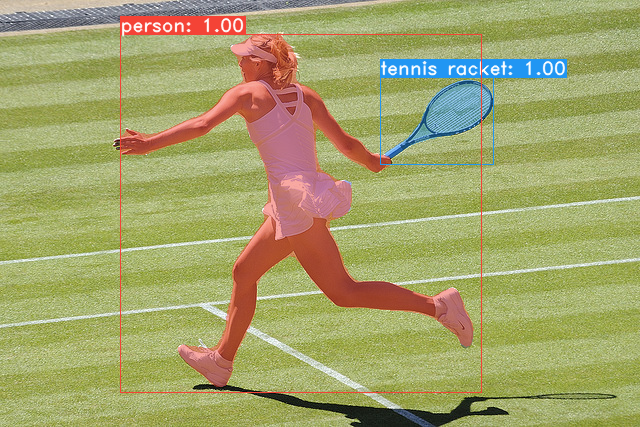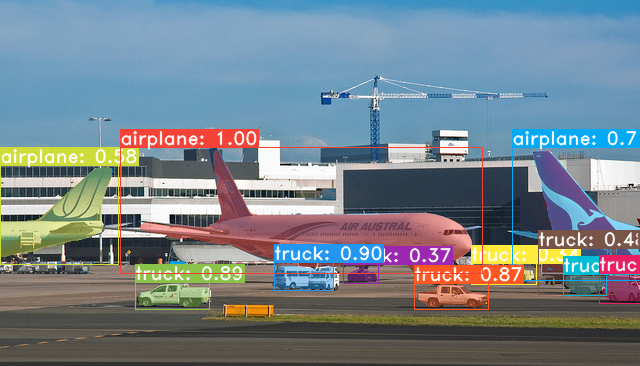██╗ ██╗ ██████╗ ██╗ █████╗ ██████╗████████╗
╚██╗ ██╔╝██╔═══██╗██║ ██╔══██╗██╔════╝╚══██╔══╝
╚████╔╝ ██║ ██║██║ ███████║██║ ██║
╚██╔╝ ██║ ██║██║ ██╔══██║██║ ██║
██║ ╚██████╔╝███████╗██║ ██║╚██████╗ ██║
╚═╝ ╚═════╝ ╚══════╝╚═╝ ╚═╝ ╚═════╝ ╚═╝
A model for realtime instance segmentation. Yolact is still in development, so all of this is still subject to change. Here's a look at our current results (31.5 fps on a Titan Xp):
Because the acronym YOLACT doesn't fit our method anymore, the current name for our model is "Single Shot Segmenter". This, however, is also subject to change.
- Set up a Python3 environment.
- Install Pytorch 1.0.1 (or higher) and TorchVision.
- Install some other packages:
# Cython needs to be installed before pycocotools pip3 install cython pip3 install opencv-python pillow pycocotools matplotlib - Clone this repository and enter it:
git clone https://github.com/dbolya/yolact.git cd yolact - Download the COCO dataset and the 2014/2017 annotations. Note that this script will take a while and dump 21gb of files into
./data/coco.sh data/scripts/COCO.sh
- To train, grab a pretrained VGG16 or Resnet101 model and put it in
./weights. - Run one of the training commands below.
- Note that you can press ctrl+c while training and it will save an
*_interrupt.pthfile at the current iteration. - All weights are saved in the
./weightsdirectory by default with the file name<config>_<epoch>_<iter>.pth.
- Note that you can press ctrl+c while training and it will save an
# Trains using the default config (whatever it is at the moment) and with batch size 8 (the default).
python3 train.py
# Trains yrm10_config with a batch_size of 5 (suprise). For the 550px models, 1 batch takes up around 1.8 gigs of VRAM, so specify accordingly.
python3 train.py --config=yrm10_config --batch_size=5
# See data/config.py for a list of configs (they end with _config)
# Note that the --config paramater is eval'd so you can do clever stuff like
python3 train.py --config="yolact_resnet101_config.copy({'max_size': 600})" --batch_size=5
# Resume training config yrm10 with a specific weight file and start from the iteration specified in the weight file's name.
python3 train.py --config=yrm10_config --resume=weights/yrm10_10_32100.pth --start_iter=-1
# Use the help option to see a description of all available command line arguments
python3 train.py --help# Quantitatively evaluate a trained model on the entire validation set
# Note: the config will be parsed from the model name. If you don't want that, specify a config with --config
python3 eval.py --trained_model=weights/yrm10_10_32100.pth
# Restrict the number of images evaluated to 100 (since the full validation set will take a while)
python3 eval.py --trained_model=weights/yrm10_10_32100.pth --max_images=100
# Output a COCOEval json to submit to the website or to use the run_coco_eval.py script
python3 eval.py --trained_model=weights/yrm10_10_32100.pth --output_coco_json
# Display qualitative results
python3 eval.py --trained_model=weights/yrm10_10_32100.pth --display
# See the help option for more details (there are a lot of extra command line arguments)
python3 eval.py --help
